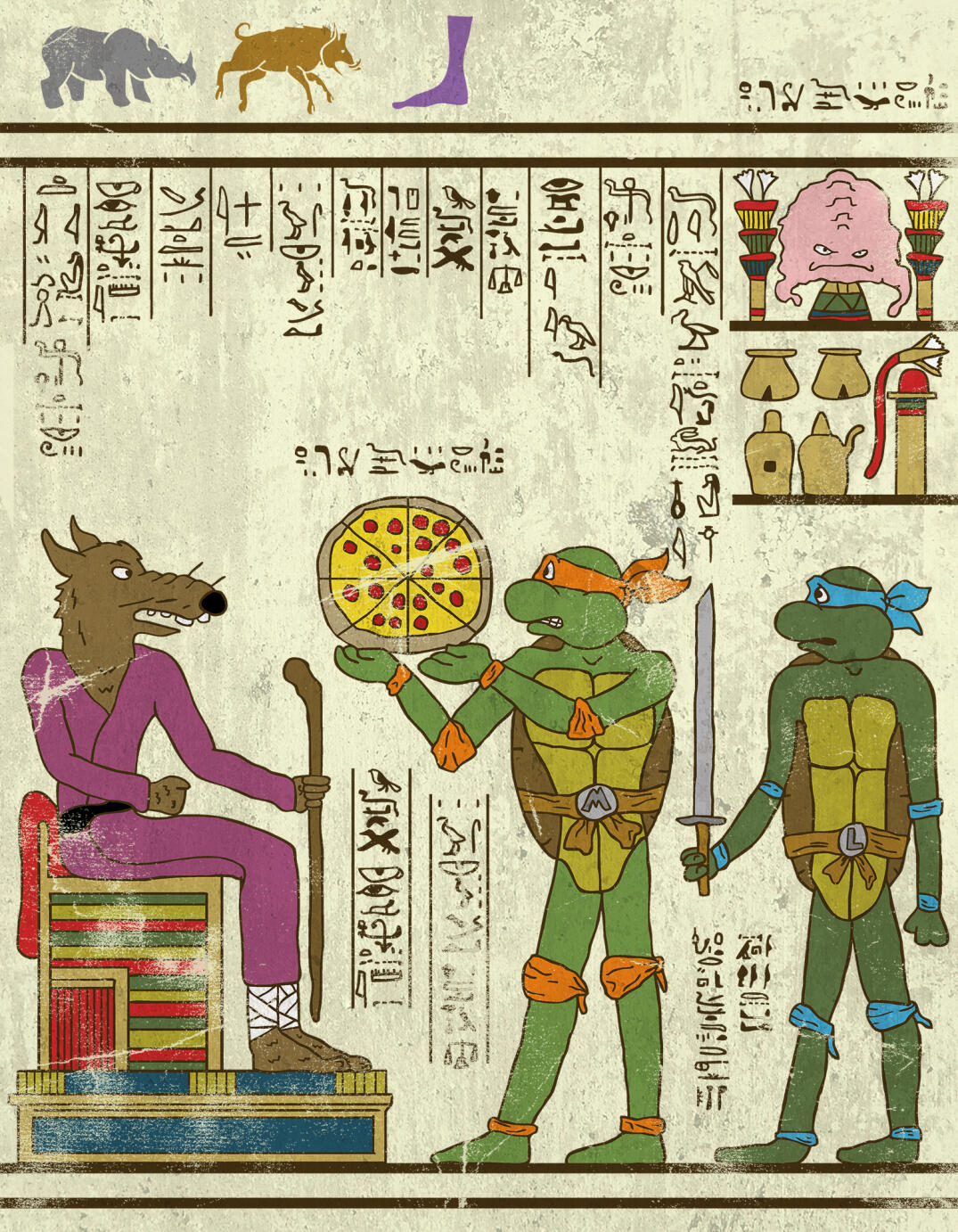A mash-up technique as an approach to art creation provides a lot of opportunities for an artist to use existing materials and rearrange their parts, thus reinterpreting reality. The advancement of technology and popular culture, as well as the development of media editing software, “have enabled a paradigmatic shift in the way people … communicate” and interpret art (Sinnreich 70).
The mash-up as a method and culture represents the works of art which are “not something fixed once and for all,” but evolve and change their meanings according to the interpretations (Manovich 36). Josh Lane, as one of the modern artists who actively uses this method, created a series of Hero-Glyphics, a bright example of which is Teenage Mutant Ninja Turtles (Lane). This work of art combines existing images and changes the original meanings to deliver an alternative story through the newly created perspective.

The analyzed mash-up is composed of two original constituents, which are Egyptian hieroglyphics and the characters from the comic book Teenage Mutant Ninja Turtles. The author intentionally places the heroes in the ancient canvas to emphasize the collision of the past and the present. The figures of Ninja Turtles are turned to the viewers while their faces are directed to the side, similarly to the original hieroglyphics.
According to Lane, he preserved the minimalistic approach of ancient Egyptians to communicate with symbols and tried to render the same ideas through new stories with modern characters (Butler par.1). The elements on the walls play a significant role in the overall meaning of the picture, thus connecting “the pop-culture and the art history” (Butler par.4). The piece gives the overall impression of amusement and inspires a perceiver to reflect on the topic of art development and its ability to represent modernity through the perspective of the past.
In separation, the elements of a Mash-up are represented by the Teenage Mutant Ninja Turtles, the comic book series authored by Kevin Eastman and Peter Laird, and Egyptian wall carvings with no single author. The rights for the characters represented in this particular work initially belonged to Mirage Studios, a company created by Eastman and Laird that issued the comic books in the universe of Teenage Mutant Ninja Turtles created by several independent artists (Tucker).
The information from the official webpage of Mirage Group suggests that the rights are sold to Viacom International Inc. This multinational mass media corporation now holds the rights for titles, logos, copyrights, and trademarks, as well as the characters themselves (The Mirage Group). One could contact Viacom via their website by sending a message using a form to Corporate Relations. As for the Egyptian stylistics, rights for it could not be traced to any person because Lane did not use a particular work of art. In addition, no information seems to be present on whether the government of Egypt forbids using their ancestral heritage in any kind of artwork.
Thus, the mash-up method used by Lane in Teenage Mutant Ninja Turtles shows the prospective opportunities rearranging the elements of two separate works might provide. Being visually attractive and even controversial due to the collision of the characters of a comic book and ancient hieroglyphics, the work tells its unique story. On a deeper level, it touches on the theme of the collision of past and present and the advancement of human possibilities even though the minimalistic methods of communication remain relevant throughout history.
Works Cited
Butler, Andy. “Hero-Glyphics by Josh Lane.” Designboom. 2014. Web.
The Mirage Group. 2019. Web.
Lane, Josh. Teenage Mutant Ninja Turtles. n.d. JOSHLN. Web.
Manovich, Lev. “Principles of New Media.” The Language of New Media, MIT Press, 2001, pp. 27-49.
Sinnreich, Aram. “The Crisis of Configurability.” Mashed Up: Music, Technology, and the Rise of Configurable Culture, University of Massachusetts Press, 2010, pp. 69-89.
Tucker, Reed. “6 Surprising Facts About the Teenage Mutant Ninja Turtles.” New York Post. 2014. Web.